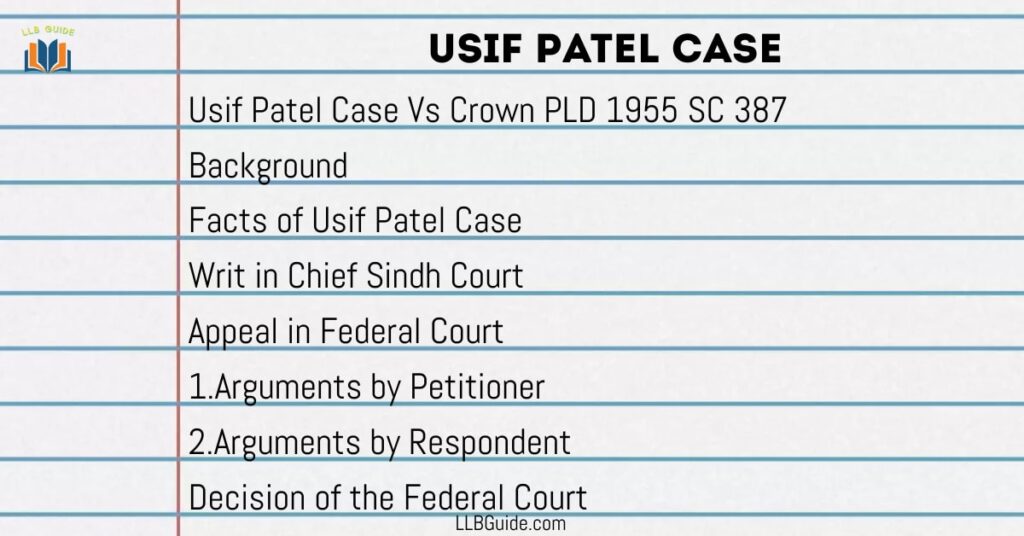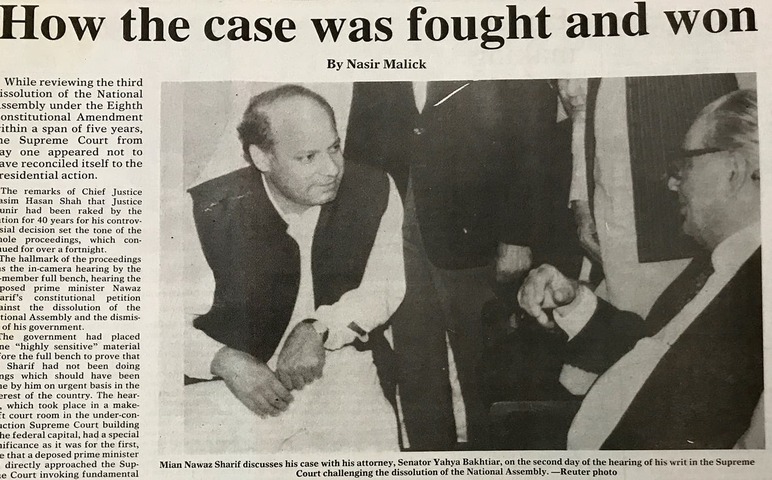Usif Patel case is also a significant case in the constitutional and judicial history of Pakistan. It started after the judgment of the Molvi Tameez ud Din case when 46 laws passed by the Constituent Assembly without the assent of the Governor General became invalid by the effect of Judgment and there arose legal crises in the country.

Table of Contents
Usif Patel Case Vs Crown PLD 1955 SC 387
Usif Patel vs Crown case or Usif Patel case has been explained below in very simple words.
Background
The very complicated background of the Usif Patel Case has been mentioned below:
In the Judgment of Molvi Tameez Ud Din case, when the Federal Court struck down section 223A of the Government of India Act 1935 because it was passed by the Constituent Assembly without the assent of the Governor General, a broader principle also settled that all laws passed by the Constituent Assembly without the assent of Governer General are invalid and ultra-virus.
By the effect of the Judgment of the Molvi Tameez Ud Din case, 46 laws that were passed by the Constituent Assembly without the assent of the Governor General also became invalid and there arose constitutional and legal crises in the country because in these 46 laws, there were some laws which changed the composition and power of Constituent Assembly and Provincial Assemblies.
To overcome this catastrophic situation Governor General Ghulam Muhammad issued an ordinance named “Emergency Powers Ordinance 1955”. In this ordinance, Governor General Ghulam Muhammad did these things:
- He gave his assent to all 46 laws with retrospective effect.
- He invested himself with the power to frame the Constitution.
- He may authenticate the budget of the Central Government.
- He declared the West Pakistan as a province.
- He changed the name of East Bengal to East Pakistan.
Under section 9 of the Indian Independence Act 1948, the Governor General may add any provision to the interim Constitution, till 31 March 1948.
The Constituent Assembly extended such authority of the Governor General till 31 March 1949 by the “Indian Independence Amendment Act 1948” (on 19 March 1948 without the assent of the Governor General).
The Governor General added section 92(A) in the Government of India Act 1935 by which he authorized the Provincial Governors to make laws for the concerned province if necessary (on 26 July 1948).
In 1952 the Governor of Sindh passed an act named as “Sindh Control of Gundas Act 1952”.
According to this law, the Government may based on doubt direct any person to furnish security that he will not breach the law or get involved in any illegal activity and if such person refuses to furnish security he may be detained.
Facts of Usif Patel Case
District Magistrate Larkana detained and confined three people namely Usif Patel, Agha Muhammad, and Syed Ali Shah because they refused to give surety following the Sindh Control of Gundas Act 1952.
Writ in Chief Sindh Court
Usif Patel and his friends moved the writ petition after the decision of the District Magistrate in the Chief Sindh Court, under section 491 of the Code of Criminal Procedure.
The Chief Sindh Court held that:
- Their confinement is legal.
- And dismissed their petitions.
Appeal in Federal Court
Usif Patel and his friends appealed the decision of the Chief Sindh Court in the Federal Court of Pakistan and challenged the validity of the “Sindh Control of Gundas Act 1952”.
Arguments by Petitioner
The petitioners mainly argued that:
- The “Indian Independence Amendment Act 1948” passed by the Constituent Assembly had no assent of the Governor-General,
- So by the effect of the judgment of the Molvi Tameez Ud Din Case, the Indian Independence Amendment Act 1948 is invalid,
- So the Section 92A is invalid,
- So the “Sindh Control of Gundas Act 1952” is invalid,
- So their detention is also invalid.
Arguments by Respondent
In Usif Patel case, the Advocate General argued that:
- The Governor General by the “Emergency Powers Ordinance 1955” has given his assent to all 46 laws with retrospective effect,
- So the “Indian Independence Amendment Act of 1948” became valid,
- So Section 92A,
- So the “Sindh Control of Gundas Act 1952” is valid.
Decision of Federal Court
In Yousaf Patel Case, there were two main questions before the Federal Court of Pakistan, that were:
- Whether the Governor General by an ordinance validate the Indian Independence Act 1948? and,
- Whether the Governor-General may give assent to Constitutional legislation by the Constituent Assembly with retrospective effect?
The Federal Court decided that:
- The Governor General had no authority to act under section 92A of the Indian Independence Act 1948 which was added by amendment without assent.
- So no power has been transferred to the Provincial Governor for legislation.
- Accordingly the “Sindh Control of Gundas Act 1952” is ultra virus.
- The detention of appealants is illegal.
- The Governor General can not give assent with retrospective effect.
- Government of India Act 1935 and Indian Independence Act 1948 are constitutional and the Governor General is incompetent to validate them by ordinance.
The Federal Court also elaborated the fact that the Governor General had no power to frame the Constitution, only the Constituent Assembly had such power, which was dissolved.
Conclusion
Like Molvi Tameez Ud Din Case, Chief Justice Muhammad Munir in Yusuf Patel Case once again passed the judgment on the fact that all laws passed by the Constituent Assembly without the assent of the Governor General are invalid.

